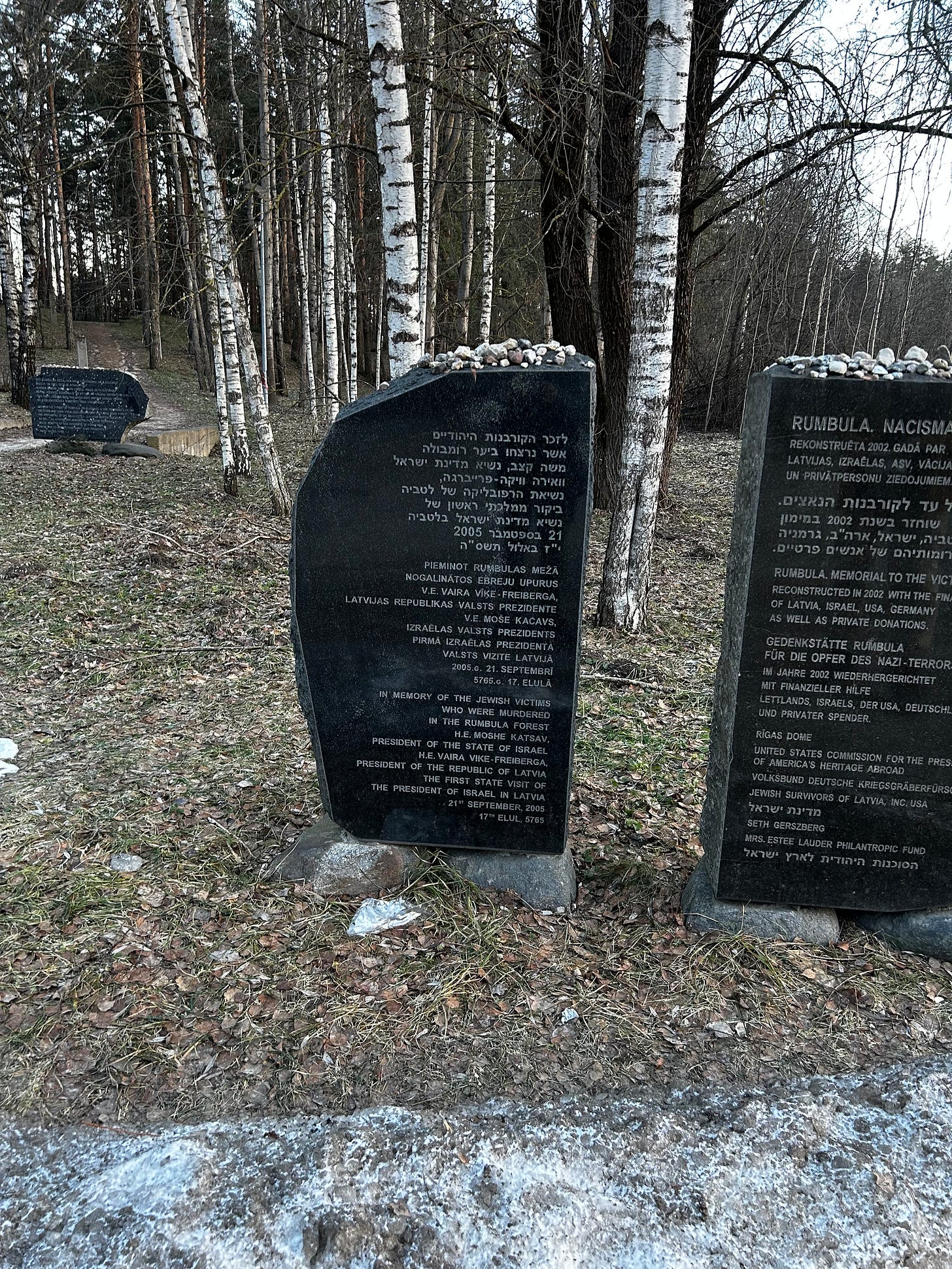“Four hoarse blasts of a ship’s whistle still raise the hair on my neck and set my feet to tapping.”
John Steinbeck (1902-1968)
“All of us are complicit to some degree.”
Barack Obama
“The assumption…was that we would find a way to fix the democratic system and move forward and instead what happened…is that a very talented populist … came forward and captivated people’s imagination.”
Fracisco Toro on the collapse of Venezuela on my podcast, here
THIS IS NOT INVESTMENT ADVICE. INVESTING IS RISKY AND OFTEN PAINFUL. DO YOUR OWN RESEARCH.
Today I want to talk about our blindness to our own culpability. If you are here for the investment logic, jump to the paid section below.
As a rule, we humans have a strong sense of fairness, unless it applies to our missteps, at which point a self-deceiving force takes over. This is easier to see the further you get from your accustomed surroundings and observe others as opposed to yourself.
Take Riga. Terrible things have happened here. Not far from where I write this, tens of thousands of Jews were rounded up, taken out to a forest—Rumbula--and shot.
Not that long ago, either. Separately, in a jail disguised as a house in downtown Riga, Latvians who had the temerity to disrespect Stalin were arrested, sent to camps thousands of miles east, and then shot. So it is quite clear both Germans and Russians did awful things here.
Visitors can get a dose of this history by visiting the old KGB headquarters or the Holocaust museum, which I did on a day the temperature didn’t get above 10 degrees and the wind pulled ice box air off the Daugava River.
But what about the Latvians who willingly went along with the Germans and the Russians? That is skated over in memorials and when I brought it up in a conversation, a Latvian in the room seemed instantly uncomfortable. A bit of digging revealed there is indeed a reluctance to talk about who among the Latvians collaborated with either the Soviet or Nazi overlords, a collaboration that likely continues today with the FSB.
One woman in a neighboring state, Lithuania, did break the silence. The writer Ruta Vanagaite discerned her grandfather had been involved in the murder of Jews and sought to dig out the history. It turned out that the Nazis had “enormous local assistance” as her co-author, Efraim Zuroff, noted in a talk about their 2020 book Our People. Those who tried to shield Jews were more worried about their neighbors informing on them than getting caught by the Nazis.
At the Holocaust memorial, a plaque notes that “German death squads, along with local auxiliaries” killed the Jews. Germans are the bad guys, which of course they were. But that the “local auxiliaries” were many times the size of the Germans directing them doesn’t get revealed. Thanks, Google.
The Latvians now rely on NATO to keep the Russians at bay. This new configuration makes them predisposed to embrace the US and Europe. Recently, the Latvian foreign minister warned Russia will not stop at Ukraine. About a quarter of Latvia’s population is Russian, which the FSB has certainly infiltrated. Salaries here are low and ethnic Russians in need of some dough are an obvious target. Old questions about complicity are just below the surface.
A narrative that pits the “good” Latvian against the “oppressor” makes for a compelling story but becomes murkier if Latvians themselves bend with whatever wind is blowing the strongest. Evolutionary biologists tell us survival and propagation of our genes is instinctive. Most will do what they believe is required to achieve this goal.
This then raises another question. How often do we tilt reality to see ourselves as victims rather than perpetrators? If perpetrator is too strong a word, then how often do we fail to see our actions objectively, particularly when these actions are not particularly noble? Once you understand the pattern once in an unfamiliar place, Latvia, you see it all over.
For instance, consider what I do to pay the bills--invest. While there is a social benefit to directing capital to where it is needed and withdrawing it from where it isn’t, it’s also true that I am applying my brain to moving around assets on a computer screen. We revere people (Buffett) who do this well not because they are doing something equivalent to curing cancer but because they are rich. While I enjoy investing, it is hardly a heroic pursuit and is motivated in part by greed.
Or take US race relations. On the one hand, efforts to bring white culpability into national monuments are relatively new. The Montgomery, Alabama memorial to lynchings I recently visited opened in 2018, about 150 years after the Civil War ended. On the other hand, suggesting today’s higher rates of Black incarceration are due more to higher rates of crimes committed than a rigged system risks getting one branded as racist.[1]
Or take Gaza. Suggesting not just Hamas but also the civilian Gazans who either looked the other way or actively supported Hamas are complicit is considered by many as heresy. And suggesting a part of the problem is ultra-nationalist Israelis willing to even murder their own (Rabin) is also hardly cocktail banter. The list goes on and on. Russian liberals being arrested and exiled by Putin are indeed victims and also bear some responsibility for their feeble opposition and infighting.
That truth is complex and doesn’t lessen the evil of the obvious bad guys—Nazis, white supremacists, antisemites, dictators. But we are more comfortable casting ourselves as righteous victims than bearing some form of responsibility. The courage of the Lithuanian writer Vanagaite is, literally, one in a million. No one else out of millions of Lithuanians raised their hand and said, “That crime, it runs right through my family.”








